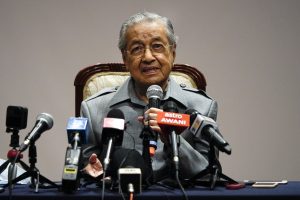Malaysian Prime Minister Muhyiddin Yassin is set to face his first test of leadership since taking the helm in March, with his predecessor Mahathir Mohammad expected to launch a no-confidence motion after Parliament begins its sitting next week.
Mahathir, who turns 95 on July 10, has made it clear he intends to bring down the current government, which was forged out of a coalition of parties after he resigned from the top job, prompting a collapse of his own administration.
The elder statesman of Malaysian politics has publicly backed Shafie Apdal, chief minister of the state of Sabah in East Malaysia, as the country’s next leader, arguing Muhyiddin does not command a majority of support in the 222-seat assembly.
Mahathir is Malaysia’s longest serving prime minister.
He ruled from 1981 to 2003 and again after winning elections in 2018 when he combined forces with his former deputy Anwar Ibrahim. In doing so, Mahathir ended a disastrous and corrupt decade under Najib Razak, who is currently before the courts on money laundering charges.
That victory was made possible by the groundswell of support from Malaysians fed up with the gross mismanagement of the Najib years, but it was also predicated upon Mahathir’s promise to hand Anwar the leadership during his first term.
However, Mahathir and Anwar’s relationship has long been marked by acrimony and political expediency and Mahathir resigned before handing power to his former protege. Anwar had previously been jailed for sodomy and homosexual acts in a trial sharply criticized for being politically motivated.
Speculation had included that Mahathir was hoping for a third term as prime minister, but it has been reported that – amid Malaysia’s tumultuous and fractious politics – Anwar already has the numbers to block any attempt by Mahathir to return.
Hence, his support for Shafie might have more to do with political need than desire.
“The important thing is that we have a solid stand for the people to know our position,” Mahathir said when declaring his support for Shafie.
Mahathir has tried to justify his broken promise, saying Anwar “is not very popular with the Malays” who make up more than 60 percent of Malaysia’s population and enjoy a legal system, slammed as racist by some, that favors native Malays as “sons of the soil.”
He has also accused Muhyiddin of attempting to block or delay a no confidence motion after Parliament initially sat for the King’s speech but was abruptly adjourned soon after.
“The new prime minister claims that he has the majority, but he’s so worried about his majority that Parliament has not been allowed to sit,” Mahathir told the CNBC television network.
The great shame of Mahathir’s resignation and the political shenanigans that followed is that a reform agenda – widely applauded by human rights activists and trade unions – has all but stalled.
That agenda included attempts end to the death penalty, a better deal for the poor, including migrant workers, and signing Malaysia on to a host of international legal conventions.
Najib’s ousting and the peaceful transfer of power had also cemented Malaysia as one of the few political brights spots in Southeast Asia, where democracies have given way to authoritarian rule, backed by militaries and elections often derided as rigged.
Malaysian politics is not for the faint-hearted, but it will survive the current shambles. After all Australia had seven prime ministers in 10 years.
But there still is a need to resolve the leadership issue – whether real or not – which creates obvious political instability, stymies legislative reforms, upsets financial markets, and in the era of COVID-19 is a problem that ordinary citizens can do without,
Luke Hunt can be followed on Twitter @lukeanthonyhunt

































